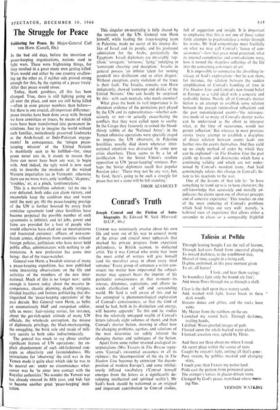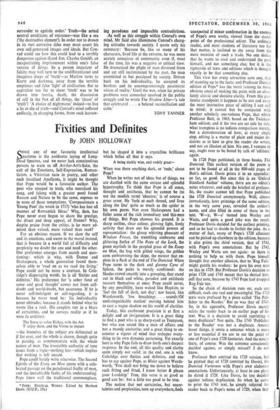Conrad's Truth
CONRAD was notoriously evasive about his own life and went out of his way to conceal many of the crises and crucial inner upheavals that marked his private progress from expatriate philanderer, to British seaman, to dedicated artist. Yet it was Conrad who wrote that 'even the most artful of writers will give himself (and his morality) away in about every third sentence.' Every group of sentences a writer con- structs (no matter how impersonal the subject- matter may appear) bears the imprint of his particular consciousness at that moment—its stresses, dilemmas, aspirations, and efforts to- wards clarification of self and surrounding world. Mr Said is well aware of this and he has attempted 'a phenomenological exploration of Conrad's consciousness, so that the kind of mind he had, both in its distinction and energy, will become apparent.' To this end he studies first the relatively untapped wealth of Conrad's letters (already eight volumes of them), and then Conrad's shorter fiction, showing in effect how the changing problems, agonies, and solutions of the man determine (or subtly inform) the changing themes and techniques of the fiction.
Apart from some rather strained analogical in- terpretations (Mrs Travers in The Rescue repre- sents 'Conrad's existential awareness in all its richness'; the 'decomposition' of the sky in The Shadow Line becomes by extension 'the decom- position of modern Europe'), and some infelici- tously inflated vocabulary (`Conrad himself emerges from the letters as a significantly de- veloping intellectual and spiritual reality'), Mr Said's book should be welcomed as an original and important contribution to Conrad studies, full of suggestion and insight. It is important to emphasise that this is not one of those rather futile attempts to psychoanalyse a writer through his works. Mr Said concentrates most fruitfully on what we may call Conrad's 'house of con- sciousness'—how that great mind perceived, what its internal complexities and contradictions were, how it turned the shapeless sufferings of the life into the containing constructs of art.
It is impossible to summarise the absorbing in- tricacy of Said's explorations—but he can show, for instance, the relation between the sudden simplification of Conrad's handling of time in The Shadow Line and Conrad's new-found belief in Europe as a valid ideal with a concrete and realisable future. Nearly all of Conrad's shorter fiction is an attempt to establish some relation between the present (uninvolved reflection) and the past (unanticipated event)—`the retrospec- tive mode of so many of Conrad's shorter works can be understood as the effort to interpret what, at the time of occurrence, would not permit reflection.' But whereas in most previous stories 'every attempt to establish a discipline of direct relation between events leads one further into the events themselves. And they yield up no single method of order by which they can be explained'—in The Shadow Line the past yields up lessons and discoveries which have a continuing validity and which are not under- mined by Conrad's mordant irony. And Said convincingly relates this change in Conrad's fic- tion to his reactions to the war.
One of the lessons of that tale is: `to have something to stand up to is to have character, the self-knowledge that accurately and morally ad- judicates the claims upon one of abstract percepts and of concrete experience.' This touches on one of the most enduring of Conrad's problems which Said brings out very well: namely, 'a habitual view of experience that allows either a surrender to chaos or a comparably frightful
surrender to egoistic order.' Truth—the actual neutral conditions of existence—was like a sea (`the destructive element'). In order not to drown in its vast corrosive tides man must assert his own self-generated images and ideals. But Con- rad could see how this could lead to a terribly dangerous egoism (Lord Jim, Charles Gould), an incapacitating imprisonment within one's false version of things. So a person impatient of falsity may well turn to the undifferentiated and imageless deeps of `truth'—as Marlow turns to Kurtz and darkness, away from the terrible emptiness and false 'light' of civilisation. But to capitulate too far to sheer 'truth' was to be drawn into inertia, death, the dissolution of self in the flux of all things, the 'chaos' of `truth'l 'A choice of nightmares' indeed—to live a lie or die of truth—and Conrad's mind suffered endlessly, in changing forms, from such harrow- ing paradoxes and impossible contradictions.
As well as this struggle within Conrad's own mind, Mr Said also illuminates Conrad's chang- ing attitudes towards society. I quote only his summary: 'Because he, like so many of his characters, lived life at the extreme, he was more acutely conscious of community even if, most of the time, his was a negative or critical view. He dramatised the plight of man divorced from and yet still incriminated by the past, the man committed to but paralysed by society. Driven back on his individuality, he accepted its burdens and its uncompromisingly pessimistic vision of reality.' Until the war, when his private problems were somewhat resolved in the public. struggle and he wrote The Shadow Line—`a tale that celebrated . . . a belated reconciliation and calm.'
TONY TANNER







































 Previous page
Previous page